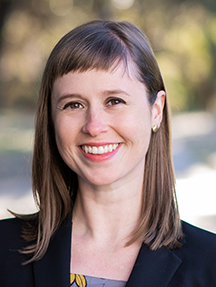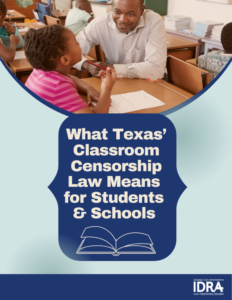• Chloe Latham Sikes, Ph.D. • IDRA Newsletter • February 2022 •
 Like others across the country, Texas K-12 schools began this year under the threat of impending school censorship. Unfortunately, many schools experienced the impact of the new laws before they even went into effect.
Like others across the country, Texas K-12 schools began this year under the threat of impending school censorship. Unfortunately, many schools experienced the impact of the new laws before they even went into effect.
The school year has been marked from the start with state scrutiny over campus libraries, classroom bookshelves, and teachers’ discussions of history, current events and racial justice. Although the Texas bills (House Bill 3979 and then its replacement, Senate Bill 3) initially appeared as “civics education” reforms, this was a weak disguise for school censorship against racial justice and gender inclusivity and against policies and practices affirming the LGBTQ+ community.
Thinly-Veiled Efforts Toward School Censorship
The Texas censorship law explicitly pertains to classroom civics education, instruction and teacher professional development. But the impact of SB 3 and other school censorship laws across the country extends far beyond the classroom walls.
Proponents of school censorship use veiled language to disguise state scrutiny as “transparency,” whitewashing as “patriotism” and attempts to rollback educational equity as “parental control.”
Indeed, censorship laws are wolves in sheep’s clothing, cloaked in superficially innocent language as they prey upon school books; diversity, equity, and inclusion initiatives; and culturally-sustaining teaching practices.
For instance, the Texas legislation says nothing about specific book titles, yet its passage fueled book ban inquiries across the state. While no books or texts are actually banned by the school censorship bills, book ban inquiries by state leadership following the passage of SB 3 led to multiple school districts holding board meetings about book lists and scouring school libraries for the books in question (Hixenbaugh, 2022). Most of the texts relate to racial justice, gender inclusivity and the experiences of LGBTQ+ people.
Education leaders also report that the bill is being used to silence conversations on diversity, equity and inclusion (DEI) across school districts and state agencies (Garrett, 2022). In some districts, educators used the bill as an excuse to pause equity initiatives (Gates, 2022).
Proponents of school censorship use veiled language to disguise state scrutiny as “transparency,” whitewashing as “patriotism” and attempts to rollback educational equity as “parental control.”
DEI initiatives focus on developing a greater sense of belonging for everyone in the school community. These initiatives often focus on deepening teacher and staff understandings about how race affects their students’ lives, how racism and discrimination restrict students’ educational opportunities, and how to understand these issues to develop more inclusive schools (Carver-Thomas, 2018; Theoharis & Scanlan, 2015). Such initiatives are important for encouraging a deeper examination of how a school district – or other institutions – recognize systemic inequities that lead to discrimination and marginalization for students and staff (Theoharis & Scanlan, 2015). Private and public sector industries have incorporated DEI initiatives as they understand that diversity of people, ideas, and inclusive work and learning settings promote better collaboration and outcomes (World Economic Forum, 2020).
The wolf of school censorship hunts not just for what is taught, but how it is taught.
School censorship bills are cited as justification to halt important programs that attend to students’ mental health and social-emotional learning (Prothero & Blad, 2021). Censorship bills have used a broad brush to characterize any subject of “discomfort” as negative.
Social-emotional learning programs help students reflect on their actions and emotions, introduce emotional intelligence and build intersocial skills among peers. These programs are supported by research in psychology, counseling and child development to promote students’ learning in the classroom and as they navigate social settings, peer interactions and major life events (Mahoney, et al., 2018). Social-emotional learning offers an important way to support students amid the ongoing COVID-19 pandemic (Rummel, et al., 2022).
Teaching practices that recognize and incorporate students’ diverse identities in learning are also targeted by censorship laws. Culturally-sustaining pedagogies are well-researched methods of teaching racially, ethnically and linguistically diverse students (Caldera, 2021), and leading diverse school campuses and institutions (Khalifa, et al., 2016). These pedagogies are predicated on affirming school community members’ identities and using them as strengths to construct a welcoming, inclusive and encouraging school environment, which is vital to student learning.
To be clear, the words equity, culturally-relevant, and culturally-responsive do not appear anywhere in Texas’ SB 3 law. Yet, the new law’s implications threaten these evidence-based approaches to healthy school systems.
IDRA’s Guide to Teaching the Truth Amid Texas’s Newest School Censorship Law
 IDRA compiled a detailed analysis of SB 3, What Texas’ Classroom Censorship Law Means for Students & Schools, to guide educators to teach the truth despite censorship efforts. We share our interpretation of the law and what this means for continuing to teach the truth in schools.
IDRA compiled a detailed analysis of SB 3, What Texas’ Classroom Censorship Law Means for Students & Schools, to guide educators to teach the truth despite censorship efforts. We share our interpretation of the law and what this means for continuing to teach the truth in schools.
Importantly, Texas schools still have not received clear guidance from the state about standard ways to implement the law’s many confusing parts, and many teachers report not yet receiving clear guidance from their districts.
In late November 2021, the Texas Education Agency issued a statement on one part of SB 3: the list of “prohibited concepts” – or censored topics – that cannot be discussed in any subject at any grade level (TEA, 2021). This statement did not include information on other components of the bill, such as a new civics academy for social studies teachers, changes to the state learning standards, or teachers’ protections against private legal action related to this bill.
Educators should still consult with their district administration for local policies related to instruction, curriculum and school activities and should urge district leadership to ensure those policies protect teachers and students.
Conclusion
The wolf of school censorship is on a more extensive hunt to weaken protections for marginalized students. School curriculum, educational programs and equity initiatives are the flavor of the day, but affirmative action initiatives, free speech and equal protection under the law are on the menu tomorrow. All members of school communities – teachers, students, leaders and families – can take steps to continue to speak up and teach the truth so that all students learn and are prepared for tomorrow.
Resources
Caldera, A. (May 2021). Equity-centered Pedagogies: An Overview of Terminology. IDRA.
Carver-Thomas, D. (2018). Diversifying the Teaching Profession: How to Recruit and Retain Teachers of Color. Learning Policy Institute.
Garrett, R. (January 7, 2022). Texas employee course removed after GOP governor candidate alleged critical race theory. Dallas Morning-News.
Gates, B. (January 13, 2022). Parent sues Eanes ISD, accuses administration of ‘secretly’ hiring diversity consultant. KXAN News.
Hixenbaugh, M. (February 1, 2022). Banned: Books on race and sexuality are disappearing from Texas schools in record numbers. NBC News.
IDRA. (2022). What Texas’ Classroom Censorship Law Means for Students & Schools. IDRA.
Khalifa, M.A., Gooden, M.A., & Davis, J. E. (2016). Culturally Responsive School Leadership: A Synthesis of the Literature. Review of Educational Research, 86(4), 1272-1311.
Mahoney, J.L., Dulark, J.A., & Weissbeg, M. (2018). An update on social and emotional learning outcome research. Phi Delta Kappan, 100(4), 18-23.
Prothero, A., & Blad, E. (December 13, 2021). “Schools face fears of ‘critical race theory’ as they scale up social-emotional learning.” EdWeek.
Rummel, N., Tan, K., & Roegman, R. (2022). Leveraging Social–Emotional Learning to Promote Excellence and Diversity, Equity, and Inclusion: A District-University Partnership. Children & Schools, 44(1), 55-57.
TEA. (November 18, 2021). Senate Bill 3, 87th Texas Legislature, Second Called Session – Update to Instructional Requirements and Prohibitions. Texas Education Agency.
Theoharis, G., & Scanlan, M.K. (Eds.). (2015). Leadership for Increasingly Diverse Schools. Routledge.
World Economic Forum. (2020). Diversity, Equity and Inclusion 4.0: A Toolkit for Leaders to Accelerate Social Progress in the Future of Work. World Economic Forum.
Chloe Latham Sikes, Ph.D., is IDRA’s deputy director of policy. Comments and questions may be directed to her via e-mail at chloe.sikes@idra.org.
[©2022, IDRA. This article originally appeared in the February 2022 IDRA Newsletter by the Intercultural Development Research Association. Permission to reproduce this article is granted provided the article is reprinted in its entirety and proper credit is given to IDRA and the author.]


